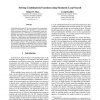Free Online Productivity Tools
i2Speak
i2Symbol
i2OCR
iTex2Img
iWeb2Print
iWeb2Shot
i2Type
iPdf2Split
iPdf2Merge
i2Bopomofo
i2Arabic
i2Style
i2Image
i2PDF
iLatex2Rtf
Sci2ools
110
click to vote
AAAI
2000
2000
Solving Combinatorial Auctions Using Stochastic Local Search
Combinatorial auctions (CAs) have emerged as an important model in economics and show promise as a useful tool for tackling resource allocation in AI. Unfortunately, winner determination for CAs is NP-hard and recent algorithms have difficulty with problems involving goods and bids beyond the hundreds. We apply a new stochastic local search algorithm, Casanova, to this problem, and demonstrate that it finds high quality (even optimal) solutions much faster than recently proposed methods (up to several orders of magnitude), particularly for large problems. We also propose a logical language for naturally expressing combinatorial bids in which a single logical bid corresponds to a large (often exponential) number of explicit bids. We show that Casanova performs much better than systematic methods on such problems.
AAAI 2000 | Combinatorial Auctions | Combinatorial Bids | Intelligent Agents | Logical Bid Corresponds |
Related Content
| Added | 01 Nov 2010 |
| Updated | 01 Nov 2010 |
| Type | Conference |
| Year | 2000 |
| Where | AAAI |
| Authors | Holger H. Hoos, Craig Boutilier |
Comments (0)

